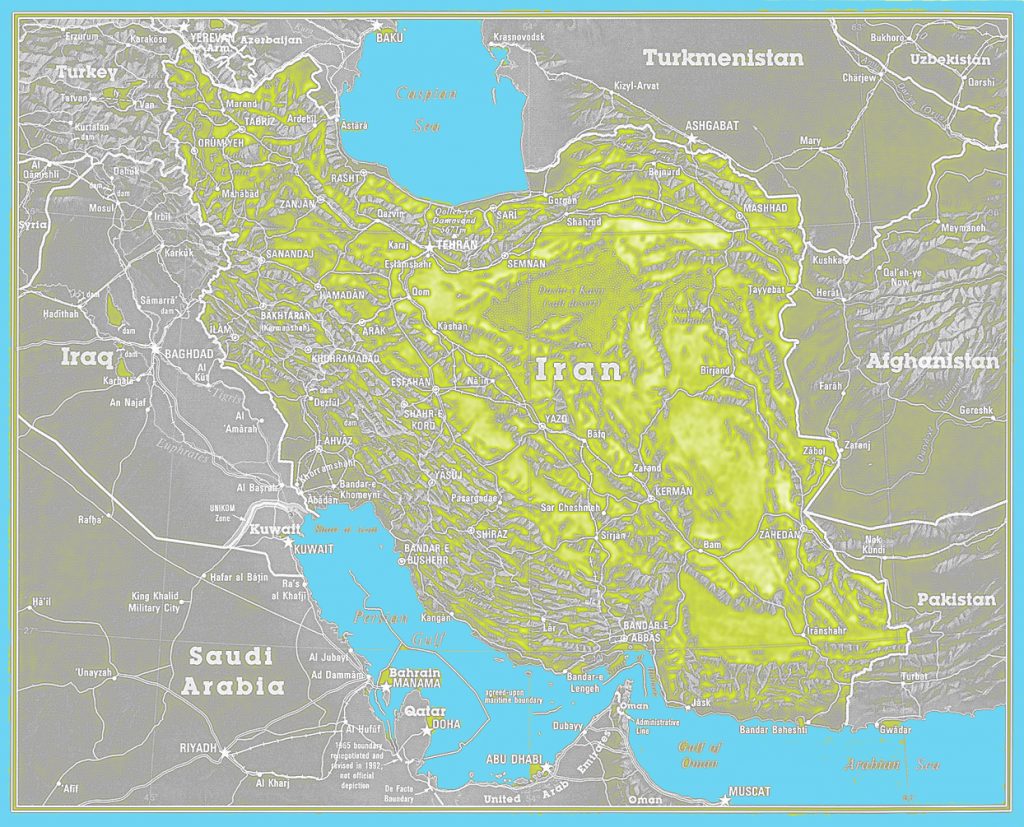A Philosophy Journal That Won’t Accept Submissions from Iranian Citizens? (updated)
In a recent interview about Russia and Ukraine at Truthout, Noam Chomsky (MIT), discussing sanctions and the toleration dissident voices in public in the United States and elsewhere, notes an example of intolerance:
I recently heard from a colleague that an article of his was returned to him, unread, by a highly respected philosophy journal in England, with a notice that the article could not be considered because he is a citizen of a country under sanctions: Iran. The sanctions are strongly opposed by Europe, but as usual, it submits to the Master [the U.S.], even to the extent of banning an article by an Iranian philosopher.
I asked Professor Chomsky for details about which “highly respected philosophy journal in England” this is, but he said he purposely left out details so as not to put anyone at additional risk of harm.

Certainly, there is no need to know the name of the author, but it would seem like a good idea to know which journal this is. If you know, let us know, or email me. Please avoid speculative accusations. Thanks.
UPDATE (4/5/22): A reader shares a form letter reply they received from a Wiley philosophy journal:
The journal welcomes contributions without restrictions from all over the world. However, we must follow sanctions law and regulations. During routine processing of your manuscript, it was recognized that one or more authors resides in a nation currently under sanctions.
This should not impede the management of the paper by Wiley, the journal’s publisher, if:
(1) neither the author nor the entity with whom the author is affiliated is on any of the following lists:
§ http://data.europa.eu/euodp/
§ http://hmt-sanctions.s3.
§ https://www.treasury.gov/
§ https://dfat.gov.au/
Or, from North Korea, Crimea or South Sudan; and
(2)(a) is not employed by the government of Iran, Syria or Cuba; or
2(b)(i) is preparing articles in their “personal capacity” (in other words, “not as an official representative or otherwise on behalf of a sanctioned government”); or
(2)(b)(ii) are employed at an academic or research institution where research or education is the primary function of the entity.
Please send us an e-mail declaring that individual authors residing in the country under sanctions are not on any of the above lists or from North Korea, Crimea or South Sudan and comply with at least one of the conditions
(2)(a), 2(b)(i) or 2(b)(ii).
Once we receive this confirmation from you, Wiley will be able to continue the processing of your manuscript.
We apologize for any inconvenience caused by this procedure. If you have any questions, please contact the Chief Editors of the journal.



Is there in fact any U.S. policy that would require that a philosophy journal not publish an article by an Iranian citizen because he or she is an Iranian citizen?
Why would it be a good idea to know this? Suppose publicizing this information prompted a Charlie Hebdo response?
That is one of the most ignorant statements I have had the misfortune of reading in a very, very long time.
Right. If it were up to these Iranians, only papers defending Sharia law, Hilary, and Hussein Obama would be accepted.
Why not trust Professor Chomsky’s judgment?
Most journals don’t ask for citizenship at any point in the process of submission or publication, so it would be very surprising if citizenship could be the cause.
Journals do usually ask for author affiliation for publication details. I could imagine a journal published by a major publisher to have some system check that refuses publication for papers coming from authors with Iranian affiliations. But since most academics are unaware of there being sanctions that target Iranian publication, it would be very surprising if a journal editor did this – it would likely come from the publisher side.
I’m an Iranian and I have many friends working in Acedemia back in home. It is actually a quite routine practice of conferences and Journals to ban/return iranian writers’ manuscripts. That is 100 percent true!
Im an iranian and I know many genius philosophs and authors in iran and they have many books published here in Iran Unfortunately the world is depriving it self from brains and ideas in US-sanctioned countries.bad for world and sanctioned states…
Isn’t this whole post a speculative accusation? This reminds me of the CUP post earlier in the week: shouldn’t we just get decisive answers on this stuff *before* posting it, lest we look like mudslingers?
https://www.ncbi.nlm.nih.gov/pmc/articles/PMC3939998/
I’d guess that’s an overly broad interpretation of US sanctions. But, yes, publishing could be prohibited in some cases, e.g., if it comes from state agents (as opposed to nongovernmental scholars representing only themselves) or involves money (e.g., publishing fees) or is about research with national security implications (i.e., that triggers ITAR).
Here’s a guidance document on that, which (like many legal and regulatory documents) can be difficult to parse:
https://home.treasury.gov/system/files/126/guidance_on_certain_publishing_activities.pdf
More info (from 2013):
https://www.science.org/content/article/scientific-journals-adapt-new-us-trade-sanctions-iran
That guidance seems to very clearly allow publication of academic philosophy articles.
The Iranian public has faced a variety of difficulties since Trump imposed sanctions. Iranian philosophers have also been part of the same Iranian public. These difficulties have hurt the Iranian people in all social, psychological and mental fields, rather than being purely economic. Imagine being an Iranian philosopher and after months and even years writing a philosophical article about an issue in Western philosophy (not an issue or a problem in classical Iranian philosophy) and sending it to an English-language journal in England and then being told that because You are Iranian, Your article cannot be read and reviewed unless you admit in a medieval style that you have nothing to do with the government. I do not think that even in the Stone Age or the Middle Ages, there was such a thing as sending a text from the East to the West and sending the insulting answer that we do not read your text because you live in Iran. Alas, philosophical journals that are supposed to promote liberal thinking and rationality have followed the orders of the likes of Trump.
You might ask a more general question of philosophy journal editors/publishers: do you refuse submissions from Iranian authors?
I do not know what is really useful for you to know that oppressed writer or philosopher or that oppressive journal. Is it useful at all? There are so many sanctions against eighty million Iranians, and this is one of them! Can you change the course of that journal? I do not think! But now suppose you have magical powers and in some way you can change the course of a journal and you must find that English journal or that Iranian philosopher. Guessing is the best option for this. Chomsky gave very specific codes. Firstly, it is a philosohy journal, secondly it is in England, thirdly it is highly respected, and fourthly it’s clear what Chomsky’s philosophical interests are and how he probably reads philosophical journals (it is very unlikely that he reads philosophy of religion or ethics, so it is usually a journal in his areas of interest, e.g. language). This brings you to a list of five or six prestigious philosophy journal in the UK that you can easily email to their editors and ask if there are any serious restrictions for Iranians. But again: what is the real benefit of this? In today’s world, tens of thousands of Iranians may have died due to drug sanctions/embargoes and drug shortages. This boycott of philosophical journals along with all the other boycotts!
Banning Iranians from philosophy journals is not the worst injustice among the many injustices caused by the crippling sanctions on Iran. But we are philosophers and our professional world is relatively small, so we have some power with respect to this particular injustice. For example, we can decide not to submit to or review for these journals.
Yes. And I, for one, would do so.
Iran’s GDP in 2021 was about 190 billion dollars, but the British GDP in the same year was eighteen times that of Iran, or about three and a half trillion dollars. Although the two countries have a population of about eighty million, they are very different economically. The richer country, England, has consistently imposed sanctions on the poorer country. Now an intelligence test: Do you think the rich country is more generous or the country under sanctions? Try! An English philosopher sends an article to a philosophy journal in Tehran and an Iranian philosopher sends an article to a journal in London! Iranian journal will probably treat you with more kindness and generosity. Ethical consequence: generosity and forgiveness are not necessarily related to wealth. On the contrary, sometimes it is quite the opposite!
Yemen is a friend and ally of Iran. In these eight years, about four hundred thousand Yemenis, including tens of thousands of Yemeni children, were killed by the Saudi weapons that Trump gave to Saudi Arabia. Question 1: Are philosophers only concerned with censoring articles, or do the lives of individuals matter to them? Second: Is it possible that Philosophy journals do not boycott or censor some articles? Is there a journal in the UK that can not boycott or censor any article? Both the philosophy journals and the English country, with its lavish history in colonialism, understand the meaning of this question well.
Yeesh. You mean the American regime, not Trump. America would have given it to them irrespective of who was President at the time.
Now transpose your Yemen story to Syria and replace Saudi Arabia with Iran. (You can throw in a nice story about Lebanon too.)
Then up the number of dead Syrians, including children.
Then consider the last 3000 years of Persian racist colonial imperialism of the entire region.
(But.. but… but… Mossadegh! Boo hoo: a drop in the bucket compared to that nation’s invidious impositions on others.)
Don’t get me wrong, I don’t think anyone should be boycotted or sanctioned. But don’t give me this kind of rhetorical crap.
This is tough to parse. It goes to your own community standards, yet begs some sort of justification, though I cannot imagine (or suss) what that might be. In homage to S. j. Gould, there ought to be some sense of NOMA here. But, geopolitical reality (?) negates such notions of reason.
There appears to be a conundrum, then. If not something less compelling, such as a thought experiment? No lo contendre.